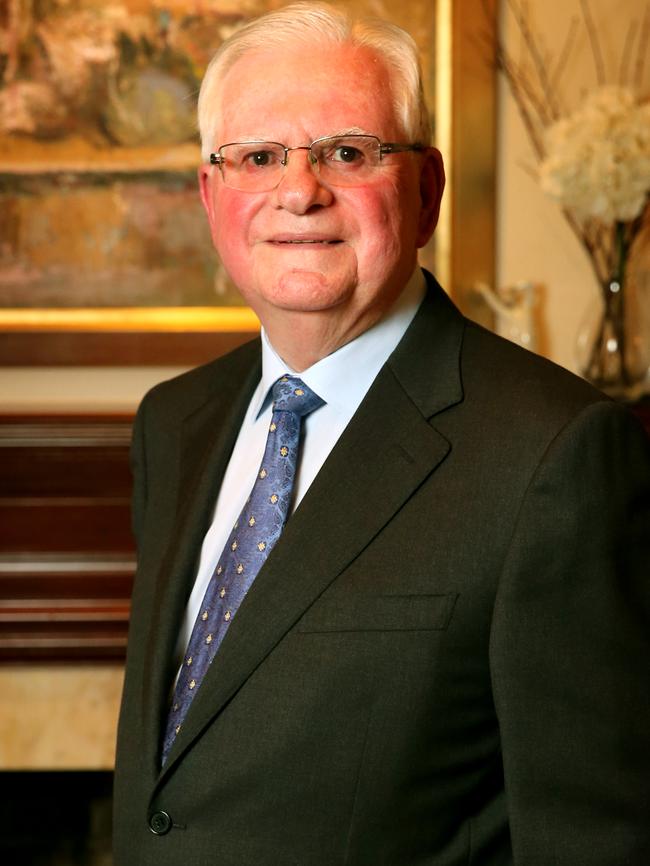Top economist’s radical tax plan to help workers save for retirement
A top economist says workers shouldn’t be taxed on savings until they retire so they can build their nest eggs.

A key architect of the nation’s $2.8 trillion superannuation system has urged the federal government to stop taxing the savings of Australians until they reach retirement.
Economist Vince FitzGerald, who led the landmark 1993 national savings inquiry after the introduction of the super system, said the move would allow workers to build bigger nest eggs during their working lives.
Instead of taxing savings and investment returns in the accumulation phase, Dr FitzGerald argued that people should be taxed at marginal rates when they were drawing money from their super funds in the pension phase.
Speaking to The Australian as the government prepares to launch a review of Australia’s retirement income system, Dr FitzGerald argued the proposal would also minimise the excessive tax concessions enjoyed by wealthy savers.
“The taxation of superannuation has been really badly handled from the very beginning,” Dr FitzGerald said.
“We should have, as I argued in that report in 1993 and still do, taxed it on a so-called expenditure basis.

“Nothing should come out of pre-tax pay in the contribution phase. Nothing should come out in the accumulation stage. This would mean compound returns would be greater. But there should be full marginal tax rates applied to withdrawals,” he said.
Labor and the well-heeled funds management industry have baulked at the prospect of another review into superannuation, which Josh Frydenberg flagged following a recommendation from the Productivity Commission. It comes amid a swag of backbench government MPs calling for a halt in any further increase to the superannuation guarantee, which is scheduled to rise from 9.5 per cent to 12 per cent by 2025.
Dr FitzGerald said one of the rationales for the introduction of super was so that people who had the ability to make a contribution to their own retirement were able to do so, rather than leaving it to future taxpayers.
“The evidence for saving future taxpayers is a bit blurry, but undoubtedly there are some savings,” he said. To encourage workers to put money into super, the government taxes wages entering the system at a concessional 15 per cent rate. Investment earnings are levied at just 15 per cent, while savings in the drawdown, or pension, phase are tax-free.
In 2016, Scott Morrison, as treasurer, capped tax-free balances at up to $3.2 million for couples and $1.6m for singles. Savings beyond the thresholds would be taxed at just 15 per cent.
The concessions mean the super system is projected to cost the federal budget more in foregone revenue than the taxpayer saves in age pension outlays until at least 2070. The age pension currently costs $50 billion a year.
Dr FitzGerald said scrapping taxes on savings while applying marginal income tax rates to pension drawdowns would be more equitable. “People who are really well off in retirement and have a lot in super would pay tax at the top marginal rate,” he said.
“The more you have, the heavier you’d be taxed, and you’d be taxed at roughly 50 per cent if you were a very wealthy person.”
While the average super balance for a man nearing retirement is about $300,000, and for women $160,000, the top 100 largest self-managed super funds control almost $8bn in low-taxed savings.
According to Australian Taxation Office data last year, 5600 SMSF members have a balance of more than $5m. There are about 420 members of large regulated super funds who have more than $5m in savings.
Dr FitzGerald said getting back to a system where savings were taxed at marginal income rates would be “very difficult” considering the furore over the Turnbull government’s changes in 2016.
Former Labor prime minister Paul Keating warned yesterday that stopping the increased rate at which workers’ wages are carved off into super would be “grand theft” as there was no mechanism to deliver greater salaries to employees coping with sluggish wages growth.
Dr FitzGerald, who chaired Mr Keating’s national savings review when compulsory super was introduced in 1992, said that any further increase in the super guarantee would likely come out of the wages of workers, but he supported the rise to 12 per cent as a means of raising retirees’ living standards.
“The fact is that the combination of compulsory super and the age pension is what a great many people will get and it will mean a higher standard of living than if there was only private savings and the age pension,” he said.
The Grattan Institute has argued that raising the super guarantee to 12 per cent would cost the budget $2bn a year in tax concessions and hurt low-income workers, while failing to drive a meaningful increase in retirement incomes or result in a lower age pension bill. Australia’s top actuary, Michael Rice, the head of consultancy Rice Warner, has argued a higher super guarantee rate should be paired with a lowering of some of the tax concessions for wealthier Australians.
Dr FitzGerald also urged the government to take up the Productivity Commission on a review of life insurance in super, where 70 per cent of Australians are charged for cover on an opt-out basis. Life insurance costs between $300-$2000 a year, and is deducted automatically from savings and provides an average $100,000 death benefit. “If you’ve got a lot of money in super why would you need life cover?” he said.



To join the conversation, please log in. Don't have an account? Register
Join the conversation, you are commenting as Logout